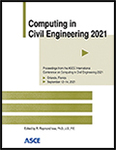Developing a Data-Driven Framework for Lighting Energy Consumption Prediction in US Office Buildings
Publication: Computing in Civil Engineering 2021
ABSTRACT
Lighting energy consumption has a significant share of energy consumed in US commercial buildings. An accurate prediction of lighting energy consumption offers energy-saving or energy-management potentials, especially in office buildings. Although office buildings’ energy performance has been studied extensively in the literature, mainly focusing on HVAC energy consumption, studies focusing on lighting energy consumption in US office buildings are limited. This study aims to develop a data-driven prediction model to estimate the office buildings’ lighting energy performance accurately. This study used Commercial Building Energy Consumption Survey (CBECS) 2012 data. First, the predictors regarding lighting energy consumption in office buildings are analyzed, and the most relevant predictors to predict lighting energy consumption are selected using LASSO regression method. Second, an artificial neural network (ANN) model is trained, using the selected predictors, to predict lighting energy consumption. This study identified 12 main variables as the most influential predictors in lighting energy prediction, including square footage of the building, percentage of light during building operation hours, number of employees working in the building, building owner type, whether there is daylight harvesting, lighting percentage during off-hours, number of businesses in the building, whether there is lighted parking area, building America climate region, percentage of occupancy, whether the building is open during the weekend, and census division. In addition, the results showed that the developed ANN model is able to predict lighting energy consumption in office buildings with an R-square value of 76% and an RMSE value of 223.17.
Get full access to this chapter
View all available purchase options and get full access to this chapter.
REFERENCES
Amasyali, K., and El-Gohary, N. (2021). Machine learning for occupant-behavior-sensitive cooling energy consumption prediction in office buildings. Renewable and Sustainable Energy Reviews, 142, 110714.
Deng, H., Fannon, D., and Eckelman, M. J. (2018). Predictive modeling for US commercial building energy use: A comparison of existing statistical and machine learning algorithms using CBECS microdata. Energy and Buildings, 163, 34–43.
Dodier, R. H., and Henze, G. P. (2004). Statistical analysis of neural networks as applied to building energy prediction. J. Sol. Energy Eng., 126(1), 592–600.
Energy Information Administration. (2017). “Trends in Lighting in Commercial Buildings.” Retrieved Nov, 2018 (https://www.eia.gov/consumption/commercial/reports/2012/lighting/).
Environmental Protection Agency. (2009). “Building and Their Impact on the Environment: A Statistical Summary.” Retrieved (http://www.epa.gov/greenbuilding/pubs/gbstats.pdf).
Kerdan, I. G., and Gálvez, D. M. (2020). Artificial neural network structure optimisation for accurately prediction of exergy, comfort and life cycle cost performance of a low energy building. Applied Energy, 280, 115862.
Gonzalez, P. A., and Zamarreno, J. M. (2005). Prediction of hourly energy consumption in buildings based on a feedback artificial neural network. Energy and buildings, 37(6), 595–601.
Kapetanakis, D. S., Mangina, E., and Finn, D. P. (2017). Input variable selection for thermal load predictive models of commercial buildings. Energy and Buildings, 137, 13–26.
Kusiak, A., Li, M., and Zhang, Z. (2010). A data-driven approach for steam load prediction in buildings. Applied Energy, 87(3), 925–933.
Leung, M. C., Norman, C. F., Lai, L. L., and Chow, T. T. (2012). The use of occupancy space electrical power demand in building cooling load prediction. Energy and Buildings, 55, 151–163.
Li, Z., Dai, J., Chen, H., and Lin, B. (2019, August). An ANN-based fast building energy consumption prediction method for complex architectural form at the early design stage. In Building Simulation (Vol. 12, No. 4, pp. 665–681). Tsinghua University Press.
Liu, Y., Chen, H., Zhang, L., Wu, X., and Wang, X. J. (2020). Energy consumption prediction and diagnosis of public buildings based on support vector machine learning: A case study in China. Journal of Cleaner Production, 272, 122542.
Ma, Z., Ye, C., Li, H., and Ma, W. (2018). Applying support vector machines to predict building energy consumption in China. Energy Procedia, 152, 780–786.
Murrieum, M., Jafari, A., and Akhavian, R. (2020, November). Building Energy Performance Prediction Using Machine Learning: A Data-Driven Decision-Making Framework for Energy Retrofits. In Construction Research Congress 2020: Computer Applications (pp. 436–447). Reston, VA: American Society of Civil Engineers.
Panchabikesan, K., Haghighat, F., and El Mankibi, M. (2021). Data driven occupancy information for energy simulation and energy use assessment in residential buildings. Energy, 218, 119539.
Sonta, A., Dougherty, T. R., and Jain, R. K. (2021). Data-driven optimization of building layouts for energy efficiency. Energy and Buildings, 238, 110815.
Tso, G. K., and Yau, K. K. (2007). Predicting electricity energy consumption: A comparison of regression analysis, decision tree and neural networks. Energy, 32(9), 1761–1768.
Wong, S. L., Wan, K. K., and Lam, T. N. (2010). Artificial neural networks for energy analysis of office buildings with daylighting. Applied Energy, 87(2), 551–557.
Zhang, L., and Wen, J. (2019). A systematic feature selection procedure for short-term data-driven building energy forecasting model development. Energy and Buildings, 183, 428–442.
Information & Authors
Information
Published In
History
Published online: May 24, 2022
Authors
Metrics & Citations
Metrics
Citations
Download citation
If you have the appropriate software installed, you can download article citation data to the citation manager of your choice. Simply select your manager software from the list below and click Download.
